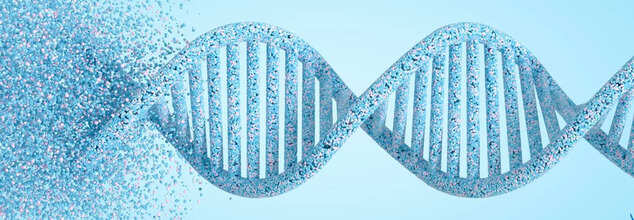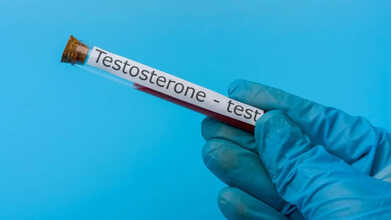- Health Conditions A-Z
- Health & Wellness
- Nutrition
- Fitness
- Health News
- Ayurveda
- Videos
- Medicine A-Z
- Parenting
What Is Biohacking? How Does It Work?

Credit: Canva
Biohacking may be the future, but not a lot of people know about it. For the advocates of this trend, it is anything that could boost your weight loss effort or help you hack your brain. American billionaire Bryan Johnson is currently the most popular biohacker, who, from time to time, comes up with ways to boost longevity. Notably, while the biological alterations he does are something that requires clinical assistance, some undertakings are relatively safe to perform at home.
What Is Biohacking?
Biohacking is a do-it-yourself (DIY) form of personal improvement in which people attempt to change aspects of their biology to improve their health, performance or well-being. It is not a specific term or undertaking. Rather, a currently popular anecdotal umbrella term for broad, nonspecific activities. There are many ways to biohack:
Fasting
People have engaged in fasts for millennia. It is not only believed to accelerate your weight loss process but also helps you get rid of toxins in your body.Nootropics
Another popular form of biohacking is using a group of substances called nootropics or "smart drugs". Non-prescription nootropics include tablets, supplements, drinks, and foods. They contain substances that manufacturers claim to help boost brain performance.
Prescription Drugs And Risks
Prescription nootropics (drugs) are medications that have stimulant effects, which doctors prescribe for medical conditions such as Alzheimer's Disease or Attention Deficit Hyperactivity Disorder (ADHD). A person should only ever take prescription medications as directed by their doctor. Prescription stimulants have several potential side effects and may be dangerous if people misuse them.
Research shows people who take prescription stimulants for medical reasons are at high risk of many diseases such as anxiety, other drug use, post-traumatic stress disorder and impaired academic performance.
Wearable Technology
Wearable tech, such as smartwatches, head-mounted displays, and fitness-tracking bands, is a common form of modern technology. People may use them to:
- track aspects of their health and use the data to make improvements
- reach fitness and health goals
- track reproductive health cycles
3 Primary Types Of Biohacking
DIY biohacking, which some people also call garage biology, involves experts in scientific fields sharing biohacking techniques and information with people who are not experts. This allows more people to conduct experiments on themselves outside of a constrained environment. Examples of these include some people who consider DIY biology to be an open revolution against the academic institutionalization of science and aim to spread an attitude of citizen science and action research without rigid gatekeeping.
Nutrigenomics
It is another type of biohacking that explores how food interacts with people's genes and how a person's genes affect their body's response to food. Researchers are using nutrigenomics to learn more about diet and genes, how they may affect a person’s health risks, and to help find new ways to prevent and treat disease. In this case, a person can send samples to labs where they are tested
Grinders
Grinders are biohackers who consider themselves pioneers of human augmentation. Example: Bryan Johnson. This type of biohacking typically involves devices implanted under the skin and the use of technology to perform body modifications.
Do You Also Have An Awful Sore Throat? It Could Be The New Mysterious Adenovirus

Credits: iStock
Do you feel an awful soar in your throat? Have you noticed that anyone you speak to are also complaining of the same symptoms? All of them, and you, seem tired, have a sore throat and no energy for days and weeks to follow. This might be what people are called "mystery disease" or the "mystery throat virus". However, this is actually the adenovirus.
Most patients with bad throat, explain experts have adenovirus, which is a common virus that spreads throughout the year. However, unlike the flu and COVID, which now have their own prescribed medicines, adenovirus has none.
Read: This Mysterious New Virus Could Spread Faster Than Covid-19 And Flu
What Exactly Is Adenovirus?
Adenovirus is a virus that has more than 60 different strains, which is why it is able to cause a variety of symptoms. Adenovirus refers to a group of common viruses that usually trigger cold- or flu-like illness. It spreads easily because it is far more resilient than many other viruses. Ordinary soap, water, and standard disinfectants do not reliably destroy it, allowing it to persist in the environment. As a result, infections often cluster in places where people spend time close together, such as daycares and military barracks. The virus spreads through the respiratory tract, can be shed in stool, and can survive for some time on contaminated surfaces, according to the CDC.
The reason for its spread right now is due to the surge of flu cases in the southern hemisphere which has influenced the outbreaks in the northern hemisphere. Another reason is the lower flu vaccinate rates, which has now made a large number of population more vulnerable to infections, overall, including adenovirus.
What are The Symptoms Of Adenovirus And What Makes It Very Contagious?
While a lot of the symptoms mimics of those in flu or COVID, including shortness of breath, a sore throat and or a runny nose. However, there are certain unique symptoms of adenovirus that include:
- Diarrhea
- Pink Eye or conjunctivitis
- Ear infection or otitis media
- Swollen lymph nodes
- Pneumonia
- Stomach pain
- Nausea
- Vomiting
Other rare symptoms could also include impact on your bladder or nervous system. As viruses in your bladder can also cause urinary tract infections, and the same virus in your nervous system can cause condition that can affect your brain. These conditions also include encephalitis and meningitis.
Read: Unique Symptoms Of Mysterious Adenovirus And How Long Infection Now Last
What makes this virus unique is that it can spread through easily. Adenovirus is highly contagious. It can spread from one person to another through shaking hands, kissing, or even hugging. The virus could also spread through sneezing, coughing, and if by any other means respiratory droplets transfers to other person in air. It can also spread by touching contaminated surface, and you can get the virus by touching your eyes, nose, or mouths if you do not wash your hands.
The virus can also spread through stool of an infected person. For instance, you can be infected while changing your baby's diaper. It can also spread through unchlorinated water, and a person can be infected with the virus if he or she swims in a pool without adequate chlorine.
Adenoviruses are resistant to many common disinfectants. Therefore, they can remain infectious on surfaces for a long time.
When Should You See A Doctor?
If you are generally healthy, and feel a little down, but do not have shortness of breathe or a high fever, you are safe to go, with supportive care at home. However, pay close attention to those who are already on medical attention, or those who are immunocompromised, or are infants.
If you are sick, have a high fever, and experiencing shortness of breath, it is best to consult your doctor. However, do not show up to your doctor's office, call first.
Ben Sasse Health Announcement: Is His Cancer Terminal?

Credits: Wikimedia Commons
Ben Sasse, former Senator, on Tuesday shared that he has been diagnosed with pancreatic cancer. His diagnosis came at Stage 4.
Is Ben Sasse's Cancer Terminal?
The former two-term senator, 53, revealed this in a social media or X, message: “This is a hard note to write, but since many of you have already sensed something, I’ll get straight to it: Last week I was diagnosed with metastasized, stage-four pancreatic cancer, and I am going to die.”
Also Read: 2 Dead, 21 Injured After Pennsylvania Nursing Home Catches Fire
Stage 4 cancers are terminal and his terminal diagnosis was "hard for someone wired to work and build, but harder still as a husband and a dad," he said.
Stage 4 cancers are terminal because the cancer has metastasized, which means it has spread from its original site or the primary tumor to distant organs and tissues. This makes it extremely difficult to cure with localized treatments like surgery or radiation.
However, the American Oncology Institute does note that stage 4 cancer always does not have to be terminal, especially with breakthrough treatment options like targeted therapy, immunotherapy, or precision medicine. There are now also advanced surgical techniques that use minimal invasion procedures.
Also Read: Ben Sasse Diagnosed With Stage 4 Pancreatic Cancer: What We Know About His Diagnosis
What Is The Chance Of Survival In Stage 4 Cancer?
According to the American Cancer Society, pancreatic cancer makes up about 3 percent of all cancers in the United States but accounts for roughly 8 percent of cancer-related deaths. Most patients are diagnosed at Stage 4, and the disease is widely regarded as largely incurable. Prostate cancer, by contrast, is the second most common cancer among men, and the majority of those diagnosed do not die from it. The five-year relative survival rate for non-metastasized prostate cancer is 97.9 percent, dropping to about 38 percent once it spreads. These figures highlight how early detection and effective treatment options make prostate cancer far more survivable than pancreatic cancer.
What Are The Treatment Options For Ben Sasse At Stage 4 Cancer?
While treatments including chemotherapy, radiation, and in rare situations surgery are available, stage-four pancreatic cancer is still considered largely incurable. The absence of effective early screening contributes to delayed diagnosis, and although a small number of patients, such as Ruth Bader Ginsburg, have lived longer following surgery, these cases are rare. Well-known individuals including Alex Trebek and Aretha Franklin also battled the disease, which remains one of the deadliest cancers in the United States.
Former senator and former University of Florida president Ben Sasse announced on Tuesday, Dec. 23, that he has been diagnosed with terminal stage 4 cancer, as per CNN News.
In the deeply personal message, the former Republican lawmaker from Nebraska described the diagnosis as a “death sentence,” while expressing appreciation for the steady support of his family and close friends.
“I’m fortunate to have incredible siblings and half a dozen friends who are truly like brothers to me. As one of them said, ‘Yes, you’re on the clock, but all of us are.’ Death is a cruel thief, and none of us escape it,” he added.
Can Increasing Testosterone Help You Conceive? Doctors Explain

Credits: Canva
For many men trying to conceive, testosterone sounds like an obvious answer. It is often linked with strength, vitality, and male health, so the assumption is that higher levels must also support fertility. In reality, the opposite is often true. Medical experts caution that using testosterone, especially without supervision, can interfere with sperm production and quietly lower the chances of becoming a father.
To know more about the same, we got in touch with Dr. Ambavarapu Divya Reddy, Fertility Specialist, Nova IVF Fertility, LB Nagar, Hyderabad.
Can Increasing Testosterone Help You Conceive?
Dr. Ambavarapu Divya Reddy said, the short answer is no. Testosterone is a male sex hormone, but it does not support fertility in the way many people assume. In fact, taking testosterone can work directly against sperm production. For men who want children, using testosterone without expert guidance can quietly reduce fertility rather than improve it. Here is what doctors want patients to understand.
Why Testosterone Does Not Boost Fertility?
Testosterone is fundamentally opposed to male fertility when taken from outside the body. Using testosterone injections, gels, patches, or pellets suppresses the natural communication between the brain and the testicles that keeps sperm production going. Dr Reddy said, “When this system is switched off, sperm counts fall and in some cases drop to zero. Fertility declines instead of improving.”
This is why men who plan to have children should never begin testosterone therapy without speaking to a specialist.
How Does Sperm Production Work?
Sperm are produced in the testicles with the help of testosterone that is made inside the testicles themselves. This internal testosterone is tightly controlled by the brain through a hormone called luteinizing hormone, or LH.
Dr Reddy told us, when external testosterone is introduced into the body, the brain senses enough hormone is present and stops releasing LH. As a result, the testicles reduce their own testosterone production and sperm production slows or stops altogether.
In real-world practice, many men on testosterone therapy develop extremely low sperm counts or complete absence of sperm, known as azoospermia, often without any obvious symptoms. This is a well-recognised cause of male infertility and one that is largely preventable.
Low Testosterone And Fertility: What Doctors Do Instead
If a man truly has hypogonadism, meaning he has symptoms along with low testosterone levels on blood tests, treatment is still possible but must be handled carefully. Current guidelines from the AUA, ASRM, and endocrine societies strongly advise against starting standard testosterone replacement in men who want children in the near future.
Instead, specialists use treatments that can raise testosterone levels while allowing sperm production to continue. These include clomiphene, human chorionic gonadotropin or hCG, and other targeted therapies that stimulate the testicles rather than shutting them down. Updated guidance for 2024 and 2025 stresses identifying the cause of low testosterone and choosing options that protect fertility.
If you think you have low testosterone but want children
a) Do not self-prescribe testosterone.
b) Consult a reproductive urologist or endocrinologist.
c) Ask about fertility-preserving treatments such as clomiphene or hCG and consider sperm banking if timing matters.
d) If you have already used testosterone, request a semen analysis and hormone tests. Acting early can help guide recovery or fertility treatment.
Testosterone may seem like an easy solution, but external testosterone is a common and avoidable cause of male infertility. If having children is important to you, proper testing and specialist care matter. The treatment that relieves symptoms is not always the one that protects your ability to become a father.
© 2024 Bennett, Coleman & Company Limited

